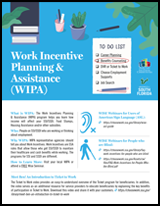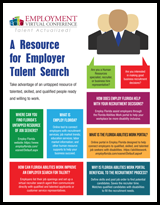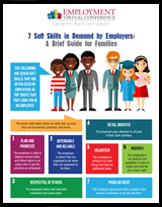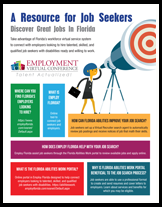Employment
 About Employment
About Employment
The Florida Center for Inclusive Communities (FCIC) at the University of South Florida develops supports and services in the areas of Education, Early Childhood, Employment, Community Supports, and Interdisciplinary Training. fcic.org The following staff leaders provide contributions to the field of employment: Denise R. Barnes, Christine Hugh, and Dr. Tammy Smith.
The FCIC employment activities have strong collaborations with the Florida Developmental Disabilities Council, Florida Department of Education/Division of Vocational Rehabilitation, and Agency for Persons with Disabilities and Social Security Administration.
- For more information and resources contact Denise R. Barnes, drbarnes@usf.edu, 813-974-1063 or toll free 1-866-818-4797 or visit Florida Center for Inclusive Communities at www.fcic.org
Employment Resources Spotlight
For Job Seekers, Parents, and Professionals
CareerSource Centers
The Florida Department of Economic Opportunity offers CareerSource Centers to help job seekers and employers. Services for job seekers include help with your job search, employability skills training, find a job, recruitment events and much more. Services for employers include posting jobs, employed worker training, and much more.
Employ Florida Marketplace
Employ Florida Marketplace is the State of Florida's official job search website.
Employee Benefit Security Administration Toolkit for Job Seekers
We all need clear and accurate information to secure our financial well-being. This toolkit provides a path forward, based on where you are in your employment journey. The pandemic has disrupted the personal finances of many Americans. As a result, large numbers of people — including those with disabilities — are making employment–related decisions based on their new financial situation. You may be one of them. This toolkit helps everyone secure their financial future. Toolkit includes:
Job Accommodation Network
The Job Accommodation Network (JAN) provides free consulting services for individuals with physical or intellectual limitations that affect employment. Services include one-on-one consultation about job accommodation ideas, requesting and negotiating accommodations, and rights under the Americans with Disabilities Act (ADA) and related laws.
LaunchMyCareerFL.org
LaunchMyCareerFL.org is a free interactive website that helps students determine their ideal majors and jobs based on programs at public institutions and training programs in Florida.
People First
The Bureau of Exceptional Education and Student Services administers programs for students with disabilities. Additionally, the Bureau coordinates student services throughout the state and participates in multiple inter-agency efforts designed to strengthen the quality and variety of services available to students with special needs.
Vocational Rehabilitation
Vocational Rehabilitation (VR) is a federal-state program that works with people who have physical or mental disabilities to prepare for, gain or retain employment. VR is committed to helping people with disabilities find meaningful careers.
- Supported Employment: Supported Employment is a unique employment service for individuals with the most significant disabilities who require ongoing support services to succeed in competitive employment.
- School-to-Work Transition: The Division of Vocational Rehabilitation’ school-to-work transition supports, and services helps students enter training, continue education, and/or find work after leaving high school. Additionally, the Division provides information about which transition services and supports are being offered, who provides the services, who is eligible for the services, and how to apply for the services.
For Employers and Self-Advocacy
Alliance for Full Participation
The Alliance for Full Participation works to increase employment opportunities for people with intellectual and developmental disabilities (I/DD). The following videos tell stories of integrated employment for people with I/DD. These short stories can be success stories, job searches in progress, or stories about a job that didn’t work out. We are looking for videos and stories from people with intellectual and developmental disabilities; employers; direct support providers; family members; co-workers—all those who have an employment story to share. The AFP YouTube channel is located link is http://www.youtube.com/user/RealJobsAFP
Disability Rights Florida
Disability Rights Florida is the designated protection and advocacy system for individuals with disabilities in the State of Florida. Their mission is to advance the quality of life, dignity, equality, self-determination, and freedom of choice of persons with disabilities through collaboration, education, advocacy, as well as legal and legislative strategies.
- Students with Disabilities: School and Work: This site provides information and resources to assist students in special education and their supports to understand the IDEA federal law, how to apply it and when to apply it. This program assists students as they work to acquire the vocational skills they will need to live and work within their respective communities. Additionally, the program assists students with planning for how those skills will be acquired. There are many ideas, services, and technologies for people with disabilities and planning can put them within reach.
- Title I – Employment: Title I of the Americans with Disabilities Act of 1990 prohibits discrimination in the workplace. Title I has been designed to address and remove barriers to employment so individuals with disabilities can enjoy the same employment opportunities as people without disabilities. A qualified individual with a disability has a right to engage in America’s workforce free of discrimination by businesses with 15 or more employees.
- Transition: Life is full of transitions. A high school student getting ready to go out into the world as a young adult is one of the more notable moments that occur in life. When the student has a disability, it’s especially helpful to plan for that transition. Disability Rights Florida provides a wide array of resources that help ensure students with disabilities are prepared to achieve success in post-secondary education and with future employment opportunities.
The Florida Abilities Work Web Portal
The Florida Abilities Work portal in the Employ Florida Marketplace was created to meet the needs of Florida employers who wish to hire qualified job seekers with disabilities who are trying to find that next great job.
Employment Supports and Resources
Agency for Persons with Disabilities (APD)
The agency supports persons with developmental disabilities in living, learning, and working in their communities. APS provides services to Floridians with autism, cerebral palsy, Down syndrome, intellectual disabilities, Prader-Willi syndrome, and spina bifida. APD also provides assistance in identifying the needs of people with developmental disabilities for supports and services.
- APD Supported Employment Services: Review of Supported Employment Services offered through the Agency for Persons with Disabilities to their customers.
Department of Education, BEESS
The Bureau of Exceptional Education and Student Services administers programs for students with disabilities. Additionally, the Bureau coordinates student services throughout the state and participates in multiple inter-agency efforts designed to strengthen the quality and variety of services available to students with special needs.
Florida Alliance for Assistance Services and Technology FAAST
FAAST is a non-profit organization funded by the US Department of Education through the Assistive Technology Act of 2004, Rehabilitation Services Administration (RSA), and the Florida Division of Vocational Rehabilitation.
- Online Resource Library: Quick access to information on a wide range of assistive services – FAAST's Online Resource Library, Employment Resources, and Self‐Help Guide for Individuals with Disabilities.
Florida APSE
APSE is the only national organization with an exclusive focus on integrated employment and career advancement opportunities for individuals with disabilities. APSE leads in the advancement of equitable employment for people with disabilities.
Florida Developmental Disabilities Council (FDDC)
The Developmental Disabilities Council is a non -profit organization that receives federal assistance from the Department of Health and Human Services Administration on Developmental Disabilities. The mission of the Florida Developmental Disabilities Council, Inc., is to advocate and promote meaningful participation in all aspects of life for Floridians with developmental disabilities.
The Able Trust
Created by the Florida Legislature in 1990 (FS 413.615), the Florida Endowment Foundation for Vocational Rehabilitation, parent organization of The Able Trust, is a 501(c)(3) non-profit public/private partnership. Its mission is to be a key leader in providing Floridians with disabilities successful opportunities for employment.
National Center on Self-Employment, Business Ownership, and Telecommuting
In partnership with VCU Rehabilitation Research and Training Center (VCU-RRTC)
4514 Chamblee Dunwoody Rd, Suite 412, Atlanta, GA 30338
Phone: (470) 223-3936 | Fax: (727) 683-9646
Email: Self-Employment@griffinhammis.com
The contents of this website were funded by the U.S. Department of Education, Rehabilitation Services Administration (Grant#H263E200005). The ideas, opinions, and conclusions expressed do not represent recommendations, endorsements, or policies of the U.S. Department of Education.
New (Free) Online Self-Employment Course for Vocational Rehabilitation Professionals
The Center on Self-Employment, Business Ownership, and Telecommuting has developed a new online self-employment course, Core Self-Employment Concepts, that provides information and strategies for supporting each step in the self-employment path. This six-module course begins with a module on strategies for exploring the possibility of self-employment. The remaining modules cover the five steps of self-employment: Business Concept Development, Business Feasibility, Business Planning, Business Launch, and Maintaining the Business. Designed specifically for VR professionals, this series will build your confidence in working with individuals pursuing self-employment and provide practical information, tools, and examples. Each module takes approximately one hour to complete (up to 6 CRCs available for the course). You are encouraged to complete all six modules but have the option to complete the ones you need the most. Access the course: Core Self-Employment Concepts
National Resource Links
Supported and Customized Employment: Side by Side Referral Decision Guide
For vocational rehabilitation professionals offering both supported and customized employment approaches to pursuing employment for people with disabilities, there may be some questions about which approach is best based on an individual’s circumstances. This guide can help determine how to choose between these approaches.
Americans with Disabilities Act
For general ADA information, answers to specific technical questions, free ADA materials, or information about filing a complaint. The U.S. Department of Justice provides information about the Americans with Disabilities Act (ADA) through a toll-free ADA Information Line. Call 800-514-0301.
Division of Blind Services (DBS) Blind
DBS helps blind and visually impaired Floridians achieve their goals and live productive and independent lives. Services cover all ages from babies to senior citizens. DBS also offers Employer Services, the Braille and Talking Books Library, and the Business Enterprise Program.
Earned Income Tax Credit (EITC)
The Earned Income Tax Credit, EITC or EIC, is a benefit for working people with low to moderate income. To qualify, you must meet certain requirements and file a tax return, even if you do not owe any tax or are not required to file. EITC reduces the amount of tax you owe and may give you a refund.
Employment First Florida
In 2011, the Institute for Community Inclusion (ICI) and the National Association of State Directors of Developmental Disabilities Services (NASDDDS) partnered to help the Florida Developmental Disabilities Council (FDDC) understand national Employment First efforts and to develop an Employment First initiative in the state. The project is called the EmployME1st Project, but are mostly known as Employment First Florida.
- Employment First Florida Employment Empowerment Toolkit! The toolkit to support self-advocates, families, teachers, case managers, employment staff, and other direct support staff to make employment the first option for all Floridians with disabilities.
FYI Transition
This has the transition resources for students, families, and professionals. There is a notification that the site is getting a makeover however the existing resources are accessible.
Office of Disability Employment Policy
The Office of Disability Employment Policy (ODEP) provides national leadership on disability employment policy by developing and influencing the use of evidence-based disability employment policies and practices, building collaborative partnerships, and delivering authoritative and credible data on employment of people with disabilities.
U.S. Equal Employment Opportunity Commission (EEOC)
The EEOC is responsible for enforcing federal laws that make it illegal to discriminate against a job applicant or an employee because of the person's race, color, religion, sex (including pregnancy, transgender status, and sexual orientation), national origin, age (40 or older), disability or genetic information.
- Persons with Intellectual Disabilities in the Workplace and the ADA: The Americans with Disabilities Act (ADA), which was amended by the ADA Amendments Act of 2008 ("Amendments Act" or "ADAAA"), is a federal law that prohibits discrimination against qualified individuals with disabilities. Individuals with disabilities include those who have impairments that substantially limit a major life activity, have a record (or history) of a substantially limiting impairment, or are regarded as having a disability.
- Job Applicants and the ADA: Title I of the Americans with Disabilities Act of 1990 (ADA) makes it unlawful for an employer to discriminate against a qualified applicant or employee with a disability. The ADA applies to private employers with 15 or more employees and to state and local government employers. The U.S. Equal Employment Opportunity Commission (EEOC) enforces the employment provisions of the ADA.
- Pandemic Preparedness in the Workplace and the Americans with Disabilities Act: This technical assistance document provides information about Titles I and V of the Americans with Disabilities Act (ADA) and Section 501 of the Rehabilitation Act and pandemic planning in the workplace. *This document was originally issued in 2009, during the spread of H1N1 virus, and has been re-issued on March 19, 2020, to incorporate updates regarding the COVID-19 pandemic. It identifies established ADA principles that are relevant to questions frequently asked about workplace pandemic planning.





